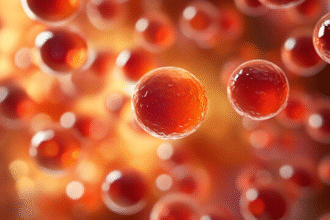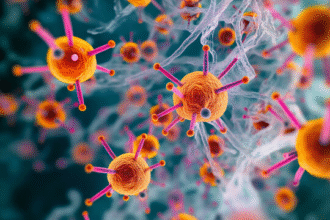Key Points
- Rare autosomal recessive disorder due to fumarylacetoacetate hydrolase (FAH) deficiency (Hereditary Tyrosinemia Type I).
- Accumulation of toxic metabolites (fumarylacetoacetate, succinylacetone) leads to progressive liver and renal injury and risk of hepatocellular carcinoma.
- Presents in infancy with acute liver failure, coagulopathy, and tubular renal dysfunction; untreated survival <1 year.
- Diagnosis by elevated plasma tyrosine and succinylacetone levels, molecular testing, and newborn screening.
- Treatment includes nitisinone (NTBC), low-tyrosine/low-phenylalanine diet, and liver transplantation for advanced disease.
Introduction
Hereditary Tyrosinemia Type I (HT-1), also called acute hypertyrosinemia, is caused by a deficiency of fumarylacetoacetate hydrolase (FAH), the final enzyme in the tyrosine catabolic pathway. Accumulation of upstream metabolites such as fumarylacetoacetate and succinylacetone causes multi-organ toxicity, primarily affecting the liver, kidneys, and peripheral nerves.
Epidemiology
- Incidence: Approximately 1 in 100,000–120,000 live births; higher in certain populations (e.g., Quebec, Finland).
- Onset: Infancy to early childhood; acute form presents within the first months of life, chronic form after age 2 years.
- No significant gender predilection.
Pathophysiology
- FAH deficiency blocks the conversion of fumarylacetoacetate to fumarate and acetoacetate.
- Toxic metabolites (fumarylacetoacetate, succinylacetone) accumulate in hepatocytes and renal tubular cells.
- Cellular damage via oxidative stress and DNA alkylation leads to liver necrosis, cirrhosis, and renal tubular dysfunction.
- Succinylacetone inhibits δ-aminolevulinic acid dehydratase, causing porphyria-like neurological crises.
Clinical Presentation
Acute Infantile Form (Type I)
- Onset: 1–6 months of age.
- Hepatic: Acute liver failure, jaundice, coagulopathy, hypoglycemia, hepatomegaly.
- Renal: Fanconi syndrome (polyuria, polydipsia, rickets).
- Systemic: Failure to thrive, vomiting, ascites.
- Neurologic: Peripheral neuropathy, episodes of porphyria-like crisis with abdominal pain, neuropathic pain.
Chronic Form (Type I)
- Onset: After age 2 years.
- Milder hepatic dysfunction with cirrhosis and risk of hepatocellular carcinoma.
- Persistent renal tubular damage and growth retardation.
Diagnostic Evaluation
- Newborn screening: Succinylacetone in dried blood spots.
- Plasma amino acids: Elevated tyrosine, methionine.
- Succinylacetone measured in urine/plasma (specific marker).
- Liver function tests: Transaminase elevation, direct hyperbilirubinemia, prolonged PT/INR.
- Renal studies: Aminoaciduria, glycosuria, phosphaturia consistent with Fanconi syndrome.
- Molecular genetic testing: FAH gene mutations.
Differential Diagnosis
- Other neonatal liver failure causes (galactosemia, tyrosinemia Type II, viral hepatitis).
- Wilson disease (later onset).
- Organic acidemias (e.g., propionic acidemia).
- Porphyria (acute neurologic crises).
Management
Nitisinone (NTBC)
- Mechanism: Inhibits 4-hydroxyphenylpyruvate dioxygenase, preventing downstream toxic metabolite formation.
- Dose: 1–2 mg/kg/day; adjust to maintain undetectable succinylacetone.
- Monitor for elevated tyrosine levels requiring dietary adjustment.
Dietary Therapy
- Low-tyrosine, low-phenylalanine diet with specialized medical formulas.
- Regular monitoring of plasma amino acids and nutritional status.
Liver Transplantation
- Indications: Acute liver failure, progressive cirrhosis, or risk of hepatocellular carcinoma despite therapy.
- Curative for hepatic manifestations; renal damage may persist.
Nursing Considerations
- Monitor growth parameters, liver and renal function tests, and coagulation profiles.
- Educate caregivers on NTBC dosing, adherence, and dietary restrictions.
- Assess for signs of hypoglycemia, bleeding, and rickets.
- Coordinate multidisciplinary care: nutritionists, hepatologists, nephrologists, and genetic counselors.
Prognosis
- With NTBC and dietary management, 2-year survival >90% and reduced risk of liver cancer.
- Lifelong treatment required; adherence critical to prevent complications.
Patient Education
- Emphasize strict adherence to medication and dietary regimen.
- Recognize signs of acute crisis (abdominal pain, neuropathy, coagulopathy).
- Importance of regular follow-up and laboratory monitoring.
- Genetic counseling for families regarding recurrence risk.
References
- Grompe M, Lindblad B, Tupa N, et al. Treatment of hereditary tyrosinemia type I by inhibition of 4-hydroxyphenylpyruvate dioxygenase. N Engl J Med. 1994;330(21):1553–1558.
- de Laet C, Dionisi-Vici C, Leonard JV, et al. Recommendations for the management of tyrosinaemia type I – European network and society for the study of inborn errors of metabolism (SSIEM) guidelines. J Inherit Metab Dis. 2013;36(4):697–709.
- Morrow G, Tanguay RM. Tyrosinemia type I: Pathogenesis, diagnosis, and treatment. J Pediatr Gastroenterol Nutr. 2014;58(2):165–172.
- Lindblad B, Lindstedt S. The role of succinylacetone in hereditary tyrosinemia. Acta Paediatr Scand. 1984;73(3):351–355.







